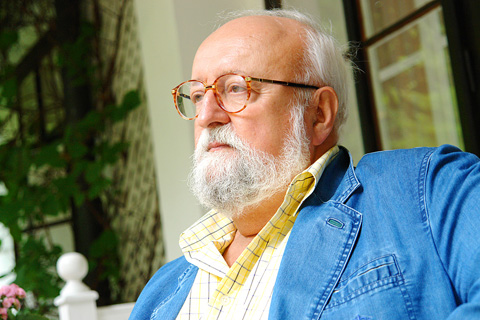The coup that the National Symphony Orchestra has brought off in getting Krysztof Penderecki to Taiwan deserves the highest praise.
Born in 1933, he became famous for writing avant-garde music when his native country was still under Soviet control. The Soviet authorities had always insisted that only traditional, tuneful music with a strong political message belonged within their empire. But when Penderecki, at the age of 27, penned a work Threnody to the Victims of Hiroshima in agonized ultra-modernist, John Cage-like style, his name was made, in the West at least.
What he brings to Taiwan tonight and tomorrow evening will be very different, however. The central items in both concerts feature a solo French horn, and that Penderecki has moved from his youthful experimentalism to a more traditional romanticism is well-known. The French horn, despite earlier associations with hunting, is as atmospheric an instrument as you can find anywhere.

PHOTO: COURTESY OF NSO
Penderecki's Horn Concerto, the centerpiece of tonight's concert in Taipei's National Concert Hall, was only unveiled in Bremen, Germany, earlier this month, and this will be its Asian premiere. The soloist then was the same we will hear in Taipei tonight, Croatian-born Radovan Vlatkovic, one of the world's most recorded horn players.
And tomorrow evening's concert in the Recital Hall will be another horn extravaganza, featuring Mozart's Horn Quintet (K.407), Brahms's Horn Trio (Opus 40), and Penderecki's Sextet for horn, clarinet, piano, violin, viola and cello. Vlatkovic also played in the premier of this work (in Vienna in 2000) with none other than Rostropovich, another old friend of Taiwan's, on the cello.
These two concerts are both musts for any classical music enthusiast. To hear Vlatkovich play the three chamber pieces tomorrow will be a unique pleasure, and the thought that Penderecki himself will have coached the players in his own item will add a unique flavor. And the great man will himself conduct tonight's larger-scale concert, which also includes his Sinfonietta for Strings and Beethoven's Seventh Symphony.
Tonight's concert is in Taipei's National Concert Hall, starting at 7.30pm. Tickets are NT$400 to NT$1,500. Tomorrow's concert is in Taipei's Recital Hall, also at 7.30, with tickets NT$300 to NT$500. For booking go to www.artsticket.com.tw, or call (02) 3393-9888.

The canonical shot of an East Asian city is a night skyline studded with towering apartment and office buildings, bright with neon and plastic signage, a landscape of energy and modernity. Another classic image is the same city seen from above, in which identical apartment towers march across the city, spilling out over nearby geography, like stylized soldiers colonizing new territory in a board game. Densely populated dynamic conurbations of money, technological innovation and convenience, it is hard to see the cities of East Asia as what they truly are: necropolises. Why is this? The East Asian development model, with

June 16 to June 22 The following flyer appeared on the streets of Hsinchu on June 12, 1895: “Taipei has already fallen to the Japanese barbarians, who have brought great misery to our land and people. We heard that the Japanese occupiers will tax our gardens, our houses, our bodies, and even our chickens, dogs, cows and pigs. They wear their hair wild, carve their teeth, tattoo their foreheads, wear strange clothes and speak a strange language. How can we be ruled by such people?” Posted by civilian militia leader Wu Tang-hsing (吳湯興), it was a call to arms to retake

Desperate dads meet in car parks to exchange packets; exhausted parents slip it into their kids’ drinks; families wait months for prescriptions buy it “off label.” But is it worth the risk? “The first time I gave him a gummy, I thought, ‘Oh my God, have I killed him?’ He just passed out in front of the TV. That never happens.” Jen remembers giving her son, David, six, melatonin to help him sleep. She got them from a friend, a pediatrician who gave them to her own child. “It was sort of hilarious. She had half a tub of gummies,

The wide-screen spectacle of Formula One gets a gleaming, rip-roaring workout in Joseph Kosinski’s F1, a fine-tuned machine of a movie that, in its most riveting racing scenes, approaches a kind of high-speed splendor. Kosinski, who last endeavored to put moviegoers in the seat of a fighter jet in Top Gun: Maverick, has moved to the open cockpits of Formula One with much the same affection, if not outright need, for speed. A lot of the same team is back. Jerry Bruckheimer produces. Ehren Kruger, a co-writer on Maverick, takes sole credit here. Hans Zimmer, a co-composer previously, supplies the thumping